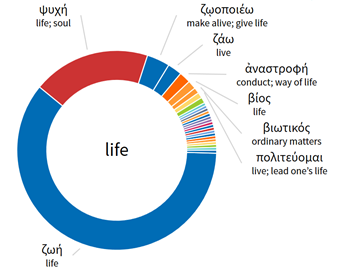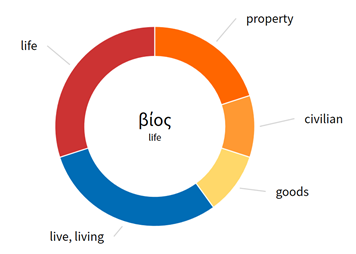Note the Greek word βίος has a small occurrence in the New Testament for the words translated life. The Greek word ζωή is used in the phrase eternal life and often implies such in its use. The Greek φωνή is used for Christ laying down his life, or for the rich farmer talking to himself.

This is how βίος is translated in the ESV New Testament:

(Graphs from Bible Word Study in Exegetical Guides in Logos Bible Software)
You can see how its usage fits very well into the context of Luke 8:14. For further reference here are the mean of βίος in the lexicons. Its meaning fits very much into what’s necessary to sustain life.
βιόω; βίοςa, ου m; βίωσις, εως f: to conduct oneself, with focus upon everyday activity—‘to live, daily life, life, existence.’
Louw, J. P., & Nida, E. A. (1996). Greek-English lexicon of the New Testament: based on semantic domains (electronic ed. of the 2nd edition., Vol. 1, p. 505). New York: United Bible Societies.
βίος, ου, ὁ (Hom.+; inscr., pap., LXX, Ep. Arist., Philo, Joseph.) life in its appearance and manifestations. …
of earthly life in its functions and its duration…
of manner of life conduct…
(…) means of subsistence…
Arndt, W., Gingrich, F. W., Danker, F. W., & Bauer, W. (1979). A Greek-English lexicon of the New Testament and other early Christian literature : a translation and adaption of the fourth revised and augmented edition of Walter Bauer’s Griechisch-deutsches Worterbuch zu den Schrift en des Neuen Testaments und der ubrigen urchristlichen Literatur (p. 141-142). Chicago: University of Chicago Press.
When you look at ὑπὸ μεριμνῶν καὶ πλούτου καὶ ἡδονῶν τοῦ βίου, μεριμνῶν καὶ πλούτου καὶ ἡδονῶν all have no article. One article at the beginning would link them together while each having an article would separate them. What is noteworthy is μεριμνῶν καὶ πλούτου fit the meaning of βίος more than ἡδονῶν. Thus, even if τοῦ βίου does not grammatically link to μεριμνῶν καὶ πλούτου, the meaning does. What does seem to say that τοῦ βίου grammatically links to all three is the three nouns make a progression. First one cares about sustaining the lives of one’s family, then one accumulates riches, and finally one enjoys the pleasures of those riches.
Another possibility is the three nouns don't have articles if Jesus' original discourse was in Hebrew/Aramaic. Nouns in the construct state do not have the article, but take the article of the post-construct. If this is the case, then life does apply to all three. For a reference see: Charles Ellicott on 1 Timothy 6:10

